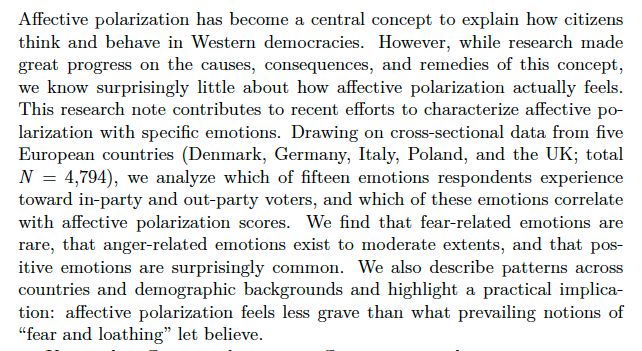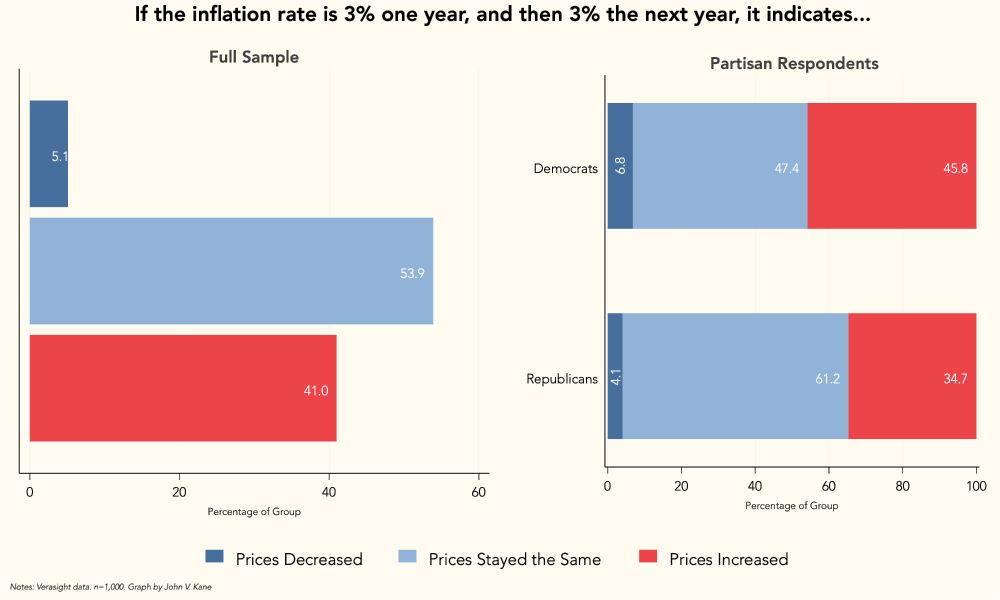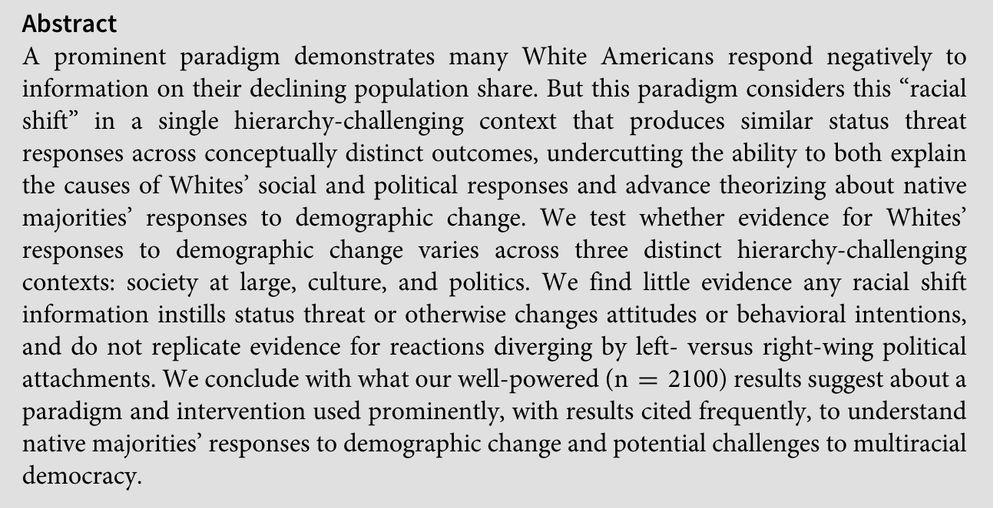Reposted by: Scott Clifford
A week before 2024 UK elections 13% of all voters used AI to ask about political topics. A randomized trial found this may be good: using AI led to similar gains in true knowledge as doing web research, regardless of model & prompt used.



Reposted by: Scott Clifford, Jacob Montgomery, Eric Hehman , and 1 more Scott Clifford, Jacob Montgomery, Eric Hehman, Nathan P. Kalmoe

New version of @twidmann.bsky.social and my working paper answering:
* Have moral appeals increased over time?
* Is the tendency to moralize ideologically patterned?
* Are some topics consistently more moralized than others?
osf.io/preprints/os...

Reposted by: Scott Clifford, Efrén O. Pérez, Jacob Montgomery
www.cambridge.org/core/journal...
"Thin" populism treatments manipulate perceptions of people-centrism + anti-elitism
But: some treatments (e.g., "American people") affect perceptions of host ideology, complicating causal analyses of impact of populist rhetoric
cup.org/4n3DvZm




by Brendan Nyhan — Reposted by: Scott Clifford, Jon Green, Efrén O. Pérez , and 1 more Scott Clifford, Jon Green, Efrén O. Pérez, David R. Miller
-correcting stereotypes/misperceptions re: affordable housing increases support for building it
-Effects often *larger* for housing near people's homes




Reposted by: Scott Clifford
Reposted by: Scott Clifford, Efrén O. Pérez, Mirya R. Holman
Reposted by: Scott Clifford
In POQ, Benjamin Newman shows that most blame structural problems for poverty among workers – but that race and personal experience shape views too.
Read now: doi.org/10.1093/poq/...


Reposted by: Scott Clifford
Do Immigrants’ Partisan Preferences Influence Americans’ Support for Immigration? - cup.org/4p2Xskp
- @danielmcdowell.bsky.social & David A. Steinberg
#FirstView

by Ethan Porter — Reposted by: Scott Clifford

Reposted by: Scott Clifford
Read more:
link.springer.com/article/10.1...

Seems like a very timely paper for behavioural scientists using online samples: osf.io/preprints/so... ;
We really need more papers on this issue

Reposted by: Scott Clifford, Ariel White
connect.apsanet.org/s42/newslett...

by Brendan Nyhan — Reposted by: Scott Clifford, Lisa W. Fazio, David Lazer , and 22 more Scott Clifford, Lisa W. Fazio, David Lazer, David Brady, Gordon Pennycook, Linda J. Skitka, Laura K. Taylor, Jonathan M. Gilligan, Justin H. Kirkland, Adam Gamoran, Smith, Karen Benjamin Guzzo, Samuel Workman, Julia Lynch, Roopika Risam, Dean Eckles, Brian Keegan, Barrett, Jason Lyall, Christopher Barrie, Jill A. Jacobson, Stuart J. Turnbull‐Dugarte, Hisham Zerriffi, Laurent Hébert‐Dufresne, Clark Gray
Please share with your networks. I am the search chair and happy to answer questions!

Reposted by: Scott Clifford
Reposted by: Scott Clifford, Brendan Nyhan, Efrén O. Pérez , and 1 more Scott Clifford, Brendan Nyhan, Efrén O. Pérez, Mirya R. Holman
Reposted by: Scott Clifford, Mark J. Brandt, Chris Hanretty
There is an increasing array of tools to measure facets of morality in political language. But while they ostensibly measure the same concept, do they actually?
I and @fhopp.bsky.social set out to see what happens.
by Scott Clifford — Reposted by: Efrén O. Pérez, Mirya R. Holman
Add content on statistical power to your social science courses.
Not just to methods courses.
For substantive courses, Bloom's MDE (i.e., 80% power to detect 2.5*SE) is easy to teach and really helpful!
www.carlislerainey.com/blog/2025-08...

by Scott Clifford — Reposted by: Scott Clifford, Justin H. Kirkland
tamu.qualtrics.com/jfe/form/SV_...

Reposted by: Scott Clifford
Ekin Dursun and I ask what instruments best manipulate emotions on surveys (osf.io/56h4g).
We find that vignettes really work! They have large effects on emotions of interest & smaller effects on emotions *not* of interest.
But as always, it's complicated.👇
(1/17)

Reposted by: Scott Clifford
This fellowship recognizes outstanding scholarship and potential in the field of Elections, Public Opinion, and Voting Behavior.
Reposted by: Scott Clifford, Victor Asal
Field Experiments Invoking Gloating Villains to Increase Voter Participation: Anger, Anticipated Emotions, and Voting Turnout - cup.org/45KpoSo
- Gregory A. Huber, Alan S. Gerber, Albert H. Fang & John J. Cho
#OpenAccess

Reposted by: Scott Clifford, Justin H. Kirkland, Efrén O. Pérez
In a forthcoming paper at @poqjournal.bsky.social, Taylor Carlson, @stevenwwebster.bsky.social, and I examine what we call "partisan embarrassment," including looking at the ramifications of these feelings...

Reposted by: Scott Clifford, Mark J. Brandt
Research shows citizens in many Western democracies are increasingly affectively polarized––they feel warm toward their own party but quite cold toward opposing parties.
But how does it feel to “feel warmly”?
@katharinalawall.bsky.social, @mtsakiris.bsky.social & I asked.
🧵1/8

by John Kane — Reposted by: Scott Clifford
But do citizens understand how to interpret inflation rates?
Using some new data from @verasight.bsky.social, the answer seems to be largely: no.
On top of that, Republicans show significantly less understanding than Democrats.

Reposted by: Scott Clifford, John Kane
www.cambridge.org/core/journal...



